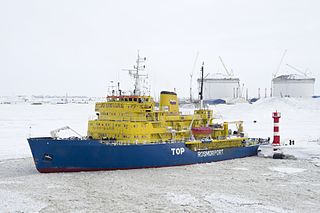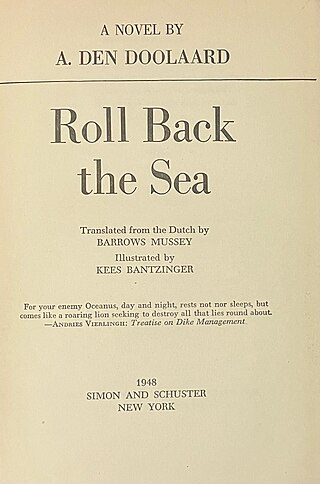
Dredging is the excavation of material from a water environment. Possible reasons for dredging include improving existing water features; reshaping land and water features to alter drainage, navigability, and commercial use; constructing dams, dikes, and other controls for streams and shorelines; and recovering valuable mineral deposits or marine life having commercial value. In all but a few situations the excavation is undertaken by a specialist floating plant, known as a dredger.

The Dubai Islands, formerly known as the Deira Islands are four undeveloped artificial islands off the coast of Deira, Dubai, United Arab Emirates. The project was initially called Palm Deira and was planned to be part of the Palm Islands. As of 2021, little development has taken place on the islands due to the financial crisis of 2007–2008.

Garden Reach Shipbuilders & Engineers Ltd, abbreviated as GRSE, is one of India's leading shipyards, located in Kolkata. It builds and repairs commercial and naval vessels. GRSE also builds export ships.
The Ports of the United States handle more than 2 billion metric tons of domestic and import/export cargo annually. U.S. ports handle a wide variety of goods that are critical to the global economy, including petroleum, grain, steel, automobiles, and containerized goods. Reports from individual ports indicate that approximately 4.6 million automobiles passed through American ports in 2006.

China Communications Construction Company, Ltd. (CCCC) is a majority state-owned, publicly traded, multinational engineering and construction company primarily engaged in the design, construction and operation of infrastructure assets, including highways, bridges, tunnels, railways, subways, airports, oil platforms, and marine ports. CCCC has been a contractor for numerous Belt and Road Initiative projects. It is included in the Fortune Global 500 list for 2016.

The Port Phillip Channel Deepening Project (CDP) began on 8 February 2008 to deepen the shipping channels leading to Melbourne, Australia.

Boskalis Westminster N.V. is a Dutch dredging and heavylift company that provides services relating to the construction and maintenance of maritime infrastructure internationally. The company has one of the world's largest dredging fleets, a large stake in Smit International and owns Dockwise, a large heavylift shipping company.
China Harbour Engineering Company Ltd (CHEC) is an engineering contractor and a subsidiary of China Communications Construction Company (CCCC), providing infrastructure construction, such as marine engineering, dredging and reclamation, road and bridge, railways, airports and plant construction. It is the second largest dredging company in the world, carrying out projects in Asia, Africa, and Europe.
Royal Van Oord is a Dutch maritime contracting company that specializes in dredging, land reclamation and constructing man made islands. Royal Van Oord has undertaken many projects throughout the world, including land reclamation, dredging and beach nourishment. The company has one of the world's largest dredging fleets.
Offsets are compensatory trade agreements, reciprocal trade agreements, between an exporting foreign company, or possibly a government acting as intermediary, and an importing entity. Offset agreements often involve trade in military goods and services and are alternatively called: industrial compensations, industrial cooperation, offsets, industrial and regional benefits, balances, juste retour or equilibrium, to define mechanisms more complex than counter-trade. Counter-trade can also be considered one of the many forms of defense offset, to compensate a purchasing country. The incentive for the exporter results from the conditioning of the core transaction to the acceptance of the offset obligation.

Jan De Nul Group is a Belgian family-owned company, with the financial headquarters in Luxembourg, that provides services relating to the construction and maintenance of maritime infrastructure on an international basis. Its main focus is dredging, which accounts for 85% of its turnover. Other areas include civil engineering and environmental technology.
Port Freeport is the smallest (geographically) deep-water seaport along the U.S Gulf Coast. Located in Freeport, Texas . It has rail access, represents both private and public facilities. It is ranked 10th in the nation for chemicals, 19th in the nation for total tonnage, 26th in the nation for container traffic, handles over 100,000 vehicles per year and has more than 1,000 ships per year. Forbes magazine (2017) ranked Port Freeport as one of the top 10 fastest growing seaports for exports in the U.S.
Dredging, Environmental and Marine Engineering NV (DEME) is an international group of specialised companies in the field of capital and maintenance dredging, land reclamation, port infrastructure development, offshore related services for the oil & gas industry, offshore windfarm installation, environmental remediation a.o. The group is based in Zwijndrecht, Belgium, and has current operations on the five continents.
The Port of Corpus Christi is the largest port in the United States in total revenue tonnage, third largest in total waterway tonnage, and the largest crude oil export gateway in the nation. The Port of Corpus Christi is located on Corpus Christi Bay in the western Gulf of Mexico, with a 36-mile channel that is being widened and deepened to 54 feet MLLW from its current depth of 45 feet.

Sabetta is the location of a port and liquified natural gas (LNG) plant—Yamal LNG—on the Yamal Peninsula, in the north of Russia along the Northern Sea Route.
The TSHD Sospan Dau is a Dutch trailing suction hopper dredger owned by Sosban BV. The vessel has worked on dredging projects, including offshore aggregates, port maintenance, land reclamation, coastal defense and beach replenishment. The name Sospan Dau is Welsh and originates from Sosban Fach and Llanelli's tin plating industry, Sospan being the Welsh for Saucepan and Dau being Welsh for Two as the ship is a successor to the original Sospan.

Dredging Corporation of India Limited, or DCI, is an Indian dredging company which does dredging for Indian seaports exclusively. It occasionally dredges at foreign seaports in countries such as Sri Lanka, Taiwan and Dubai. It is mainly involved in maintenance dredging. Almost all the maintenance dredging in Indian seaports is carried out by DCI due to government regulations. DCI is also involved in capital dredging, beach nourishment, and land reclamation. The main seaports in which DCI does business are Visakhapatnam Port, Haldia, Kandla, Cochin Port and Ennore Port.
The Port of Payra is a seaport located at Kalapara in Patuakhali, Bangladesh. It was established by an Act of Parliament in 2013. The port was officially inaugurated in 2016. It is located on the Ramnabad Channel near the Bay of Bengal. The port is undergoing several Development and expansion and the project is expected to be completed in 202.

Royal IHC or Koninklijke IHC, previously IHC Holland (1943–1995), IHC Holland Merwede (1995–2005) and IHC Merwede (2005–2014) is a Dutch shipbuilding company with headquarters in Kinderdijk. It focuses on the development, design and construction of ships for the dredging and offshore industries.

Het verjaagde water is a 1947 Dutch non-fiction novel written by A. den Doolaard, which gives an account of the recovery works to repair dike breaches after the October 1944 Inundation of Walcheren as part of operations by The Allies of World War II during Operation Infatuate. Researchers from Delft University of Technology have found high levels of historical accuracy in den Doolaard's descriptions of the events that took place, the methods used to close the dikes and the key people involved. Den Doolaard assigned pseudonyms to most of the main characters and organisations. The name A. den Doolaard is also a pseudonym, the author’s real name being Cornelis Johannes George Spoelstra Jr.











